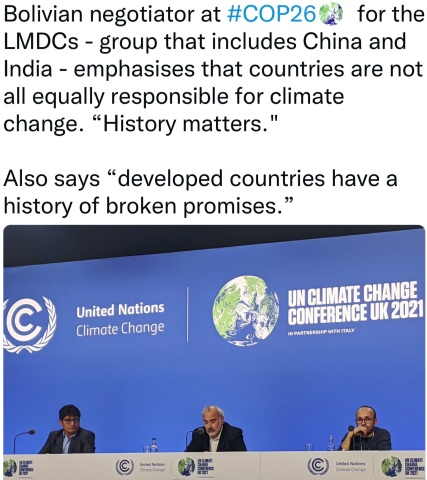File:LMDCs make their case at the Glasgow climate summit.png
LMDCs_make_their_case_at_the_Glasgow_climate_summit.png (427 × 480 pixels, file size: 259 KB, MIME type: image/png)
At the Glasgow International Climate Conference, Like Minded Developing Countries (LMDCs) make a case against 'Carbon Colonisation'
Negotiating together, twenty two countries have formed a climate negotiation group called LMDCs (Like Minded Developing Countries)
As the Glasgow conference reaches its final day, the LMDCs are speaking of 'carbon colonisation'. The Glasgow climate summit is without agreement on a climate finance and market-based mechanism for carbon reduction (carbon market), as the LMDC group publicly called for the Conference presidency not to adopt a 'mitigation centric approach' and instead keep alive a 1.5 Celsius goal as a 'collective responsibility' of all nations in the Glasgow text. The LMDCs requested the Conference 'completely remove (the proposed) paragraph on mitigation' in the summit declaration platform.
The text, which required consensus agreement, includes language on collectively *trying* to limit global warming to 1.5 degrees Celsius (Centigrade) above pre-industrial level (1850-1900), as distinct from the target under the 2015 international climate agreement reached in Paris which put 2 degrees C as the upper limit while keeping 1.5 degree C as an aspirational goal.
The Glasgow text, as currently drafted, asks for commitment from 196 countries to boost their climate targets *by 2023* to meet the 1.5 degree C goal and to submit by next year long-term decarbonization strategies to be on a net-zero trajectory.
The LMDC group that includes Bangladesh, Bolivia, China, India, Indonesia, Pakistan, Sri Lanka and other countries strongly objects to to this text language and terms the move as 'carbon colonization.'
See Common But Differentiated Responsibilities (CBDR)
Via Wikipedia
Common But Differentiated Responsibilities (CBDR) was formalized in United Nations Framework Convention on Climate Change (UNFCCC) of the Earth Summit in Rio de Janeiro, 1992. The CBDR principle is mentioned in UNFCCC article 3 paragraph 1.. and article 4 paragraph 1. It was the first international legal instrument to address climate change and the most comprehensive international attempt to address negative impacts to global environment. CBDR principle acknowledges all states have shared obligation to address environmental destruction but denies equal responsibility of all states with regard to environmental protection.
In the Earth Summit, states acknowledged disparity of economic development between developed and developing countries. Industrialization proceeded in developed countries much earlier than it did in developing countries. CBDR is based on relationship between industrialization and climate change. The more industrialized a country is, more likely that it has contributed to climate change. States came to an agreement that developed countries contributed more to environmental degradation and should have greater responsibility than developing countries. CBDR principle could therefore be said to be based on polluter-pays principle where historical contribution to climate change and respective ability become measures of responsibility for environmental protection.
Concept of CBDR evolved from notion of "common concern" in Convention for the Establishment of an Inter-American Tropical Tuna Commission of 1949 and "common heritage of mankind" in United Nations Convention on the Law of the Sea, 1982.
○
File history
Click on a date/time to view the file as it appeared at that time.
| Date/Time | Thumbnail | Dimensions | User | Comment | |
|---|---|---|---|---|---|
| current | 17:37, 12 November 2021 |  | 427 × 480 (259 KB) | Siterunner (talk | contribs) |
You cannot overwrite this file.
File usage
The following 2 pages use this file:
- Air Quality
- Air Pollution
- Agriculture
- Alternative Agriculture
- Antarctica
- Anthropocene
- Arctic
- Atmospheric Science
- Citizen Science
- City Governments
- Climate Change
- Climate Migration
- Climate Policy
- County Governments
- Desertification
- Digital Citizen
- Earth Imaging
- Earth Observations
- Earth360
- Earth Science
- Earth Science from Space
- Earth System Science
- Ecology Studies
- Eco-nomics
- Economic Justice
- Education
- Energy
- Environmental Laws
- Environmental Protection
- Environmental Security
- Environmental Security, National Security
- ESA
- European Union
- Externalities
- Extinction
- Food
- Forests
- Fossil Fuels
- Greenland
- Global Security
- Global Warming
- Green Networking
- Green Best Practices
- Green Politics
- Health
- INDC
- Maps
- Money in Politics
- NASA
- NOAA
- Natural Resources
- Networking
- New Definitions of National Security
- New Economy
- New Space
- Oceans
- Ocean Science
- Online Education
- Planet Citizen
- Planet Citizens
- Planet Citizens, Planet Scientists
- Rainforest
- Renewable Energy
- Resilience
- Sea-level Rise
- Sea-Level Rise & Mitigation
- Seventh Generation Sustainability
- Social Justice
- Soil
- Solar Energy
- Strategic Demands
- Sustainability Policies
- Threat Multiplier
- United Nations
- US
- US Environmental Protection Agency
- Water Quality
- Whole Earth
- Wind Energy
- World Bank
- World Wide Web
- Youth
